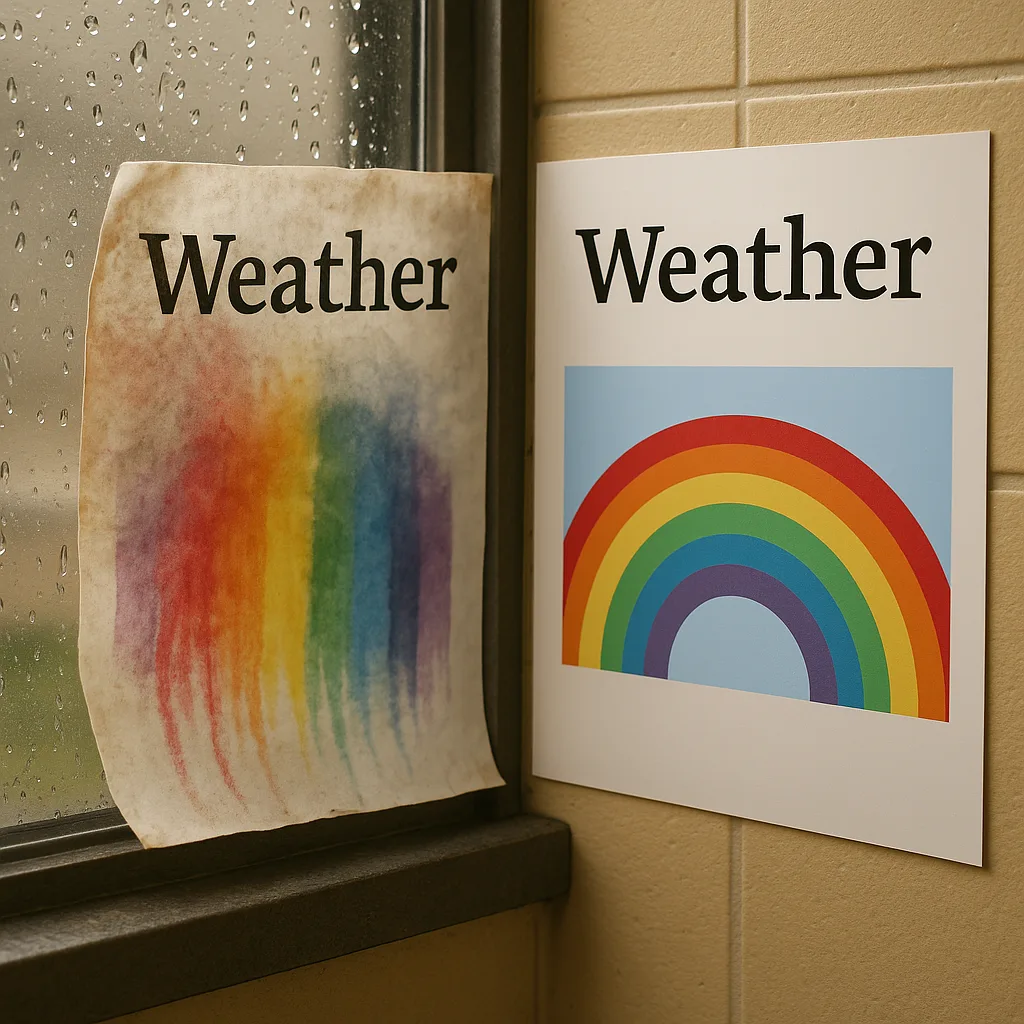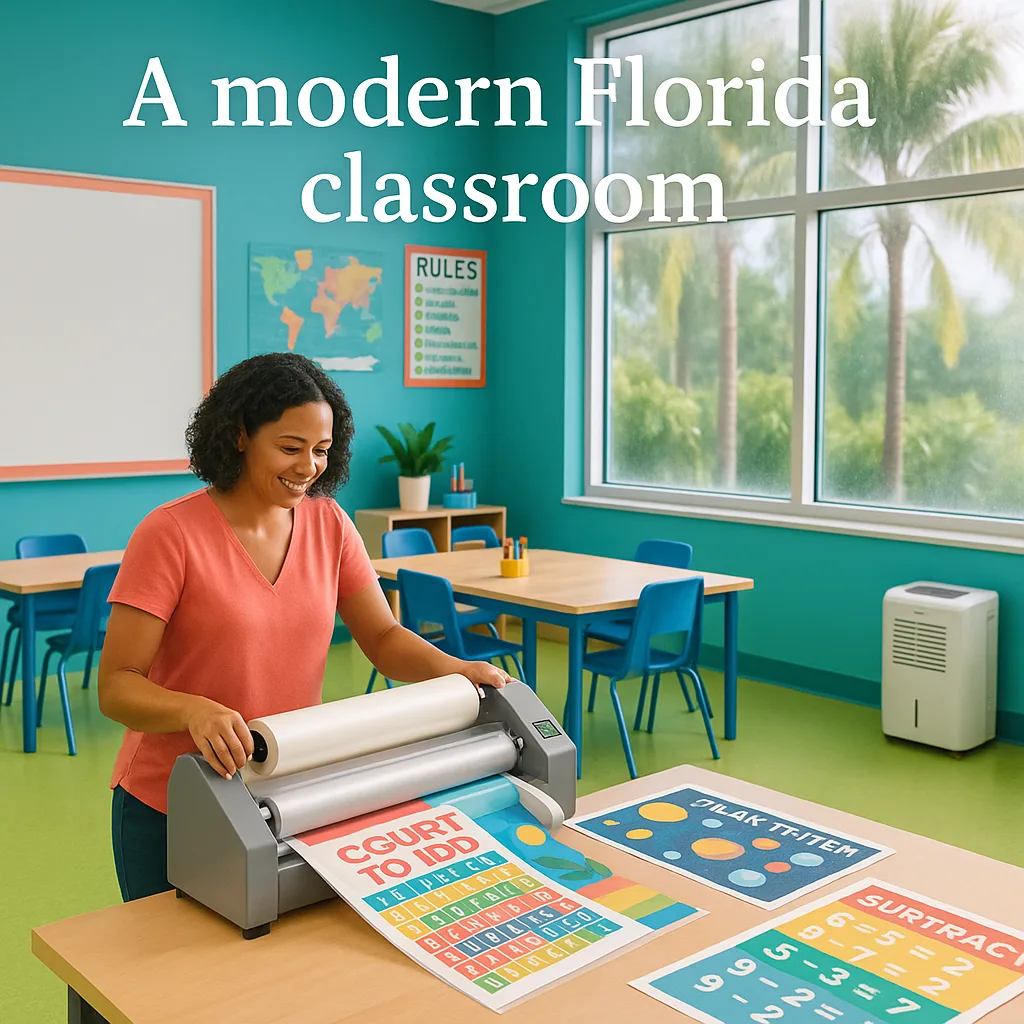Teacher Poster Maker Humidity Solutions for Florida Schools
Understanding Florida’s Humidity Challenge
Living in the Sunshine State means dealing with average humidity levels that hover around 75% year-round. For educators, this presents unique challenges that schools in drier climates simply don’t face. Moreover, the combination of air conditioning indoors and tropical conditions outdoors creates temperature fluctuations that can wreak havoc on unprotected paper materials.
In my visits to Florida schools, I’ve observed countless examples of posters curling at the edges, colors bleeding, and adhesive failing within weeks of display. Furthermore, outdoor displays face even greater challenges with frequent afternoon thunderstorms and salt air in coastal areas. These conditions demand proactive strategies to protect the valuable visual learning materials teachers create with their poster printer machines.

Humidity damage on unprotected classroom posters in a Florida school
Average annual humidity in Florida schools
Teacher Poster Maker Humidity Protection Strategies
Florida educators have pioneered innovative approaches to protect their visual learning materials. Here are their proven strategies for success.
Pre-Print Preparation
Set up your workspace with humidity control measures before printingEssential First Steps
Ensure your teacher poster maker is in a climate-controlled room. Run a dehumidifier 24 hours before major print jobs. Store paper in sealed containers with silica gel packets to maintain optimal moisture levels.Smart Material Selection
Select humidity-resistant papers and inks designed for tropical climatesChoose Wisely
Opt for synthetic papers or vinyl materials when using poster printer machines. Choose pigment-based inks over dye-based options. Consider water-resistant coated papers for critical displays.Immediate Protection
Laminate posters within 24 hours of printing for best resultsAct Fast
Never let printed materials sit unprotected overnight. Use cold lamination for heat-sensitive prints. Apply edge sealing for extra protection in high-moisture areas.Best Practices from Florida’s Top Schools
Through my work with schools across Florida, from the Panhandle to the Keys, I’ve collected invaluable insights from educators who have mastered the art of humidity-resistant poster creation. These teachers have learned through trial and error what works best in their unique climate conditions.
At Coral Springs Elementary, the media specialist transformed their approach after losing an entire hallway display to humidity damage. Now, they maintain a dedicated laminating station near their Classroom Pro 24 Poster Maker, ensuring every poster receives protection immediately after printing.
One particularly innovative approach comes from Miami-Dade schools, where teachers created “humidity zones” in their classrooms. High-moisture areas near windows and doors feature only laminated materials, while interior walls can accommodate standard prints. This strategic placement has reduced material loss by over 60%.
Additionally, many Florida schools have invested in specialized storage solutions. Clear, airtight containers protect blank poster paper, while finished products await lamination in climate-controlled cabinets. These simple steps have dramatically extended the life of both supplies and finished products.
Creating Weather-Resistant Outdoor Displays
Outdoor displays in Florida face the ultimate test of durability. Between intense UV radiation, daily rain showers, and constant humidity, standard posters simply don’t stand a chance. However, with the right materials and techniques, schools can create stunning outdoor displays that last throughout the school year.
The key lies in selecting appropriate materials from the start. When using poster printer machines for outdoor applications, synthetic substrates like vinyl or polyester film provide superior weather resistance compared to paper-based materials. Many Florida schools have discovered that investing in a weather-resistant vinyl pays for itself through reduced replacement costs.
Cost-Benefit Analysis: Protection vs. Replacement
Understanding the financial impact of proper humidity protection for your school’s visual materials
The data clearly shows that while protected materials require a higher initial investment, the long-term savings are substantial. Schools using proper lamination and humidity protection strategies typically see a 70% reduction in material replacement costs over a school year. This translates to more budget available for new educational resources rather than replacing damaged displays.
Emergency Response: Salvaging Humidity-Damaged Materials
Despite our best efforts, sometimes humidity damage occurs. Perhaps the air conditioning failed over a long weekend, or an unexpected leak exposed materials to moisture. Knowing how to respond quickly can mean the difference between total loss and successful salvage.
First, assess the damage immediately. Materials showing only slight curling or warping can often be saved through careful flattening and lamination. Place affected posters between absorbent paper and weight them down for 24-48 hours in a climate-controlled environment. Once flat, laminate immediately to prevent further damage.
For more severe cases, consider these emergency measures that Florida educators have found effective. If colors have begun to run, stop the process by freezing the material immediately. This sounds counterintuitive, but freezing halts the moisture migration that causes ink bleeding. Once frozen, allow materials to thaw slowly in a dry environment before attempting restoration.
Emergency Response Checklist
Prevention Investment Calculator
Consider these one-time investments that pay long-term dividends:
• Dehumidifier (per classroom): $200-300
• Laminating supplies (annual): $400-600
• Moisture-resistant storage: $150-250
• Environmental monitors: $50-100
Total Prevention Investment: $800-1,250
Average Annual Savings: $2,000-3,500
Final Thoughts: Embracing Florida’s Climate Challenges
As educators, we know that every challenge presents an opportunity for innovation. Florida’s humidity has pushed our schools to develop some of the most advanced poster preservation techniques in the nation. By implementing these teacher poster maker humidity protection strategies, you’re not just protecting materials – you’re ensuring that your visual learning aids remain vibrant and effective throughout the school year.
Remember, the key to success lies in prevention rather than reaction. Invest in quality equipment, establish consistent protection protocols, and train all staff members in proper handling techniques. With these measures in place, your school can create stunning visual displays that inspire learning, regardless of what Mother Nature throws your way.
The strategies shared here come from real classrooms facing real challenges. They’ve been tested in the most demanding conditions and proven effective time and again. Whether you’re in Miami, Orlando, Tampa, or anywhere else in the Sunshine State, these techniques will help you maintain professional-quality displays that enhance your learning environment and stand the test of time.

